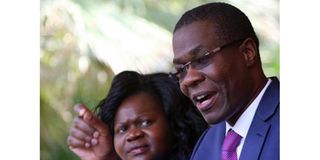Raila ally wants House recalled to enact BBI Bill

Ugunja MP Opiyo Wandayi (right) and Homa Bay Woman Representative Gladys Wanga during a past press briefing.
A legislator now wants the National Assembly and Senate recalled for a special sitting to enact the Constitution of Kenya (Amendment) Bill, 2020, sponsored by the Building Bridges Initiative (BBI).
Ugunja MP Opiyo Wandayi, who is a close ally of ODM leader Raila Odinga, says that he has requested the majority and minority leadership in parliament to petition Speakers Justin Muturi (National Assembly) and Ken Lusaka (Senate) to convene a special sitting of the two Houses no later than April 8, 2021 “to deal with this Bill.”
“Anything short of this would be a reckless abdication of duty by the House leadership. The Houses can, and should, debate the Bill and vote on it on a single afternoon,” Mr Wandayi, who is also ODM’s secretary for political affairs, says.
The Ugunja legislator argued that the task parliament has is to pass the Bill as it is and at the referendum later in the year.
“The rest we can deal with later. From my own analysis, the benefits in the BBI Bill far much outweigh the costs, real or perceived,” he added.
The Bill is a creation of the 14-member taskforce that was assembled by President Uhuru Kenyatta and Mr Odinga to implement the nine-point agenda the two leaders crafted to unite the country after their handshake on March 9, 2018.
Mr Wandayi reckons that as the clock ticks towards 2022, time is “increasingly becoming critical in our” collective drive to implement the necessary constitutional, legal and administrative reforms within the BBI framework.
“Parliament, among other institutions, must, therefore, move with speed and play its part by dispensing with the BBI Bill,” he says.
The BBI Bill among others, seeks to expand the executive by creating the position of Prime Minister and two deputies, will rename Cabinet Secretaries to Cabinet Ministers and have them appointed from among MPs in the National Assembly.
The Bill is also proposing to increase allocation to County Governments from the current 15 per cent of the national revenue as audited and approved by the National Assembly, to 35 per cent.
The Bill was presented to the two Houses of parliament simultaneously on February 25, this year.
It was later submitted by the two Speakers to the joint sitting of the committees of Justice and Legal Affairs of the National Assembly and the Justice and Human Rights Committee of the Senate for public hearings.
The two committees were required to produce a joint report to be considered by the two Houses simultaneously.
However, differences in the committee over whether it should open the Bill for amendments led to delays in tabling a report.
The request for an extension period of 14 days, lasting April 1, was granted by Speaker Muturi to allow the committee to conclude. But even as he granted the extension, Speaker Muturi directed that the House will proceed to debate the Bill on April 1, 2021 with or without the report.
However, the suspension of parliamentary sittings early this week from April 1 to April 29, in a bid to check the upsurge of the Covid-19 cases, may have complicated matters for the BBI Bill.
Before parliamentary sittings were adjourned, there was a prospect of having a referendum in June this year. However, Mr Wandayi says that the country cannot afford to lose any single day in the “crucial” BBI journey through procrastination.
“The Covid-19 pandemic is, apparently, here to stay. We must learn to live with it,” he says.
“It is for this reason that I wish to persuade the majority and minority leadership in the National Assembly and Senate to petition the respective Speakers to convene a special sitting of the two Houses to deal with this Bill.”
Standing Order 29 of the National Assembly provides that whenever a House stands adjourned during a session, the Speaker may, on the request of the leader of majority or leader of minority, appoint a day for a special sitting.
As MPs debated the adjournment motion on Tuesday, Speaker Muturi reminded them that if a critical matter of national importance crops up during the period the sittings have been suspended, the MPs will be recalled to deal with it.
Among the issues floated by the MPs which may require the House to be recalled include the passage of two revenue Bills - the Division of Revenue Bill (DoRB) and the County Allocation of Revenue Bill (CARB).
The two revenue Bills have timelines within which they are required to be passed as provided for under the Public Finance Management (PFM) Act.
For instance, DoRB, which has already been passed in the National Assembly, requires the concurrence of the Senate. The Bill is required to have been enacted by April 30, the time within which the estimates for the national government are to be tabled in the National Assembly.
CARB cannot also be considered by the Senate until DoRB has been enacted.
Yesterday, Mr Wandayi noted that the BBI Bill should be considered irrespective of the outcome of the “never-ending deliberations of the joint committee.”
“If the Committee is unable to generate one, it can as well just table the materials it has received from the public during its public hearings in the form of memoranda, petitions, reports and representations, among others,” he said.
The roadmap for the amendment of the Constitution through a popular initiative is provided for under Article 257 of the constitution.
This means that the two major stages remaining are a vote on the Bill in Parliament and the people’s verdict at the referendum.





